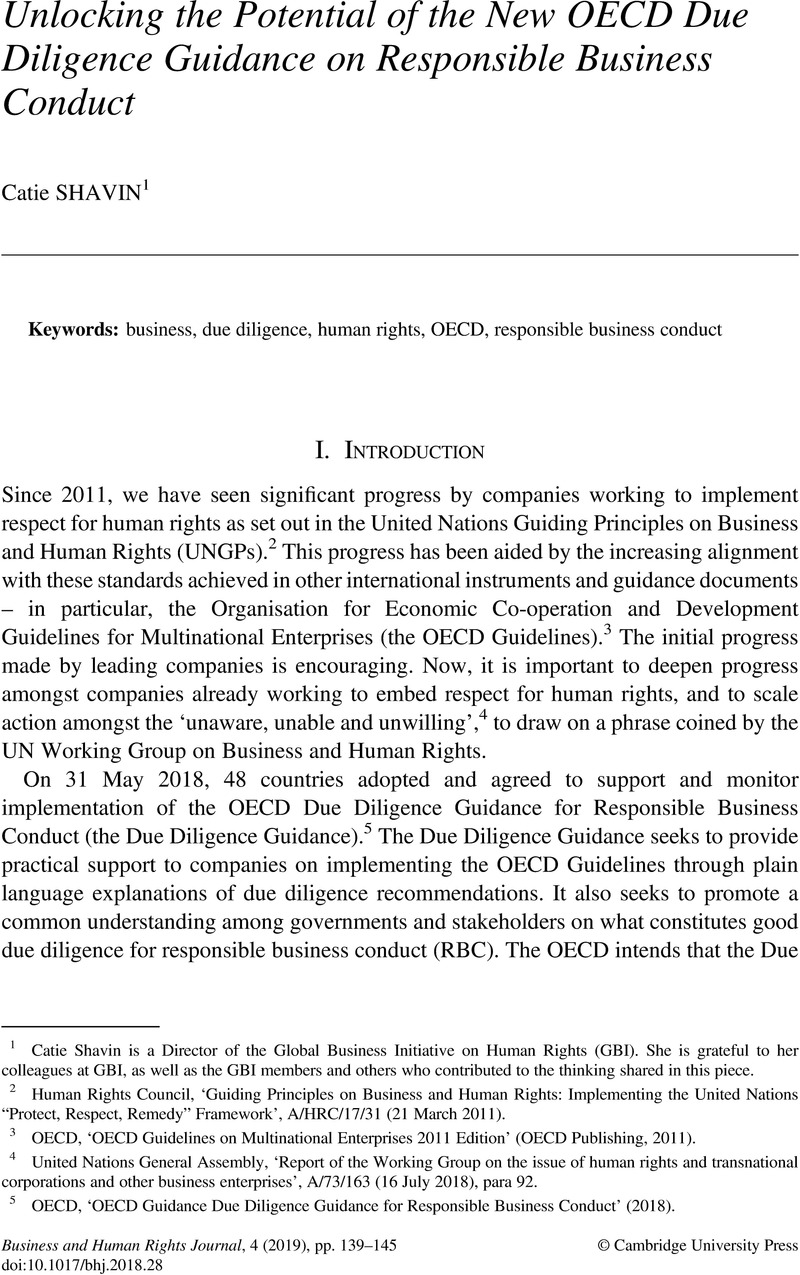Article contents
Unlocking the Potential of the New OECD Due Diligence Guidance on Responsible Business Conduct
Published online by Cambridge University Press: 17 December 2018
Abstract

Information
- Type
- Developments in the Field
- Information
- Business and Human Rights Journal , Volume 4 , Issue 1: Special Issue: Business, Human Rights and Security , January 2019 , pp. 139 - 145
- Copyright
- © Cambridge University Press
Footnotes
Catie Shavin is a Director of the Global Business Initiative on Human Rights (GBI). She is grateful to her colleagues at GBI, as well as the GBI members and others who contributed to the thinking shared in this piece.
References
2 Human Rights Council, ‘Guiding Principles on Business and Human Rights: Implementing the United Nations “Protect, Respect, Remedy” Framework’, A/HRC/17/31 (21 March 2011).
3 OECD, ‘OECD Guidelines on Multinational Enterprises 2011 Edition’ (OECD Publishing, 2011)Google Scholar.
4 United Nations General Assembly, ‘Report of the Working Group on the issue of human rights and transnational corporations and other business enterprises’, A/73/163 (16 July 2018), para 92.
5 OECD, ‘OECD Guidance Due Diligence Guidance for Responsible Business Conduct’ (2018).
6 OECD, ‘OECD Due Diligence Guidance for Responsible Business Conduct’ (2018), 3.
7 OECD, ‘Countries Commit to Step Up Efforts to Drive More Responsible Business Conduct Through New OECD Instrument’ (30 May 2018), http://www.oecd.org/investment/mne/countries-commit-to-step-up-efforts-to-drive-more-responsible-business-conduct-through-new-oecd-instrument.htm (accessed 23 October 2018).
8 OECD, note 6, 3.
9 OECD, ‘Recommendation of the Council on the OECD Due Diligence Guidance for Responsible Business Conduct’, OECD/LEGAL/0442 (30 May 2018).
10 OECD, note 6, 3.
11 For a description of the rationale that drove initial efforts to align the UNGPs and the OECD Guidelines, see Ruggie, John G, ‘Global Governance and “New Governance Theory”: Lessons from Business and Human Rights’ (2014) 20:1 Global Governance 5 CrossRefGoogle Scholar.
12 See, for example, OECD ‘Global Forum on Responsible Business Conduct: Expert Letters and Statements on the Application of the OECD Guidelines for Multinational Enterprises and UN Guiding Principles on Business and Human Rights in the Context of the Financial Sector’ (26–27 June 2014, OECD Conference Centre, Paris, France)Google Scholar.
13 United Nations General Assembly, note 4, [5].
14 For example, UK Modern Slavery Act 2015, California Transparency in Supply Chains Act 2012, Australian Modern Slavery Bill 2018.
15 L. no. 2017-399, 27 March 2017 relative au devoir de vigilance des sociétés mères et des entreprise donneuses d’ordre: JO 28 March 2017, texte no. 1.
16 Relayed to the author during a confidential discussion on 12 September 2018.
17 For example, see OECD, note 6, 46.
18 Shift and Mazars, ‘Salient Human Rights Issues’, UN Guiding Principles Reporting Framework, https://www.ungpreporting.org/resources/salient-human-rights-issues/ (accessed 23 October 2018).
19 OECD, note 6, 42.
20 Relayed to the author during a confidential discussion on 12 September 2018.
21 Responsible Business Alliance, ‘Practical Guide to Implement Responsible Business Conduct Due Diligence in Supply Chains’ (June 2018).
- 4
- Cited by

